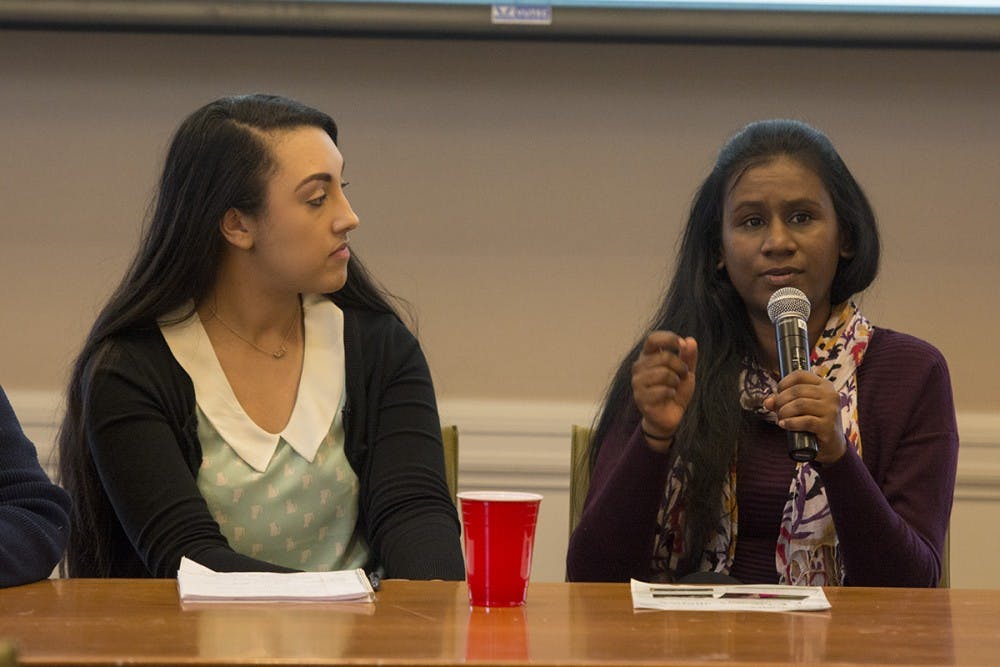The Lifting the Shades committee of Take Back the Night at the University held a discussion concerning the problems minority groups face with sexual assault last Wednesday in Newcomb Gallery. Led by the chair of the event, third-year College student Anna Taylor, four panelists from the University and Charlottesville community answered questions in front of 20 students specifically relating to the intersection of race and sexual assault.
Take Back the Night is an international nonprofit organization with the goal of ending sexual, relationship and domestic violence. Wednesday’s event was part of a larger series of events Take Back the Night at the University has hosted throughout the month of April. This year’s events included a vigil that honored survivors of sexual assault, “Silenced Voices” that dealt with sexual assault on the LGBTQ community, a policy breakdown of Title IX and “Love Shouldn’t Hurt” on intimate partner abuse.
The four panelists included — Lisa Speidel, an assistant professor in the Women, Gender and Sexuality department, Joanna Ajex, a member from the Women’s Initiative — which provides mental health services to women — Claire Kaplan, the director of the Gender Violence and Social Change Program at the University’s Maxine Platzer Lynn Women’s Center and Halle Buckles, a fourth-year College student and the outgoing president of Native American Student Union.
“Lifting the Shades” began with audience members asking panelists questions about minority issues concerning sexual assault. All panelists acknowledged the importance of fostering discussion concerning the intersectionality of these issues.
“People talk about diversity, but are you just trying to make it more colorful or do you want everybody to have a voice?” Speidel said. “That’s really hard for white women to deal with … I’ve seen things change over the last 25 years, but there is still a lot of work to be done.”
Buckles specifically brought up Native American sexual assault victims. On Native American reservations, non-Natives cannot be prosecuted on reservation land. This was decided in a 1978 Supreme Court case that stated that Native American tribes with their own justice systems cannot charge non-Native Americans.
“A lot of the women don’t speak up because justice wouldn’t be given,” Buckles said.
Second-year College and Batten student Ryan Alexander asked the panelists about the need to develop “a deep cultural understanding so we can empathize” and understand how Western culture impacts people reaching out for help.
“I work with clients from different cultures and different countries,” Ajex said. “Each of their sexual experiences and what they describe as ‘assault,’ or what is allowed in their culture, is so different from Western Culture … A person can be as traumatized with just a kiss in Indian culture in the same way as a person would be traumatized by rape.”
The event evolved into a group discussion led by Alexander. Alexander began the discussion by asking the group on their opinions of unique minority issues relating to sexual assault.
Many of the students echoed earlier comments made by the panelists. However, the discussion turned about hypothetical situations to what they personally would do if they were a victim of sexual assault.
Throughout the discussion, some students commented on what they see as inadequacies in University-sponsored programs, such as Counseling and Psychological Services through Student Health and Just Report It.
“You are already going through such an experience trying to internalize it … But the first thing you have to do is to fill out this form, call this number, and wait,” second-year Curry student Juliana Parra said.
Speidel and other student discussed the limitations of mandatory reporting.
“Before mandated reporting, we used to be able to talk to students all the time,” Speidel said.
While most agreed that the Women’s Center — which links students to resources outside of the University’s structure — was the best resource for sexual assault victims on campus, Alexander noted that the Women’s Center counseling program had a waitlist. According to Kaplan, the waitlist is filled for the next fall semester.







